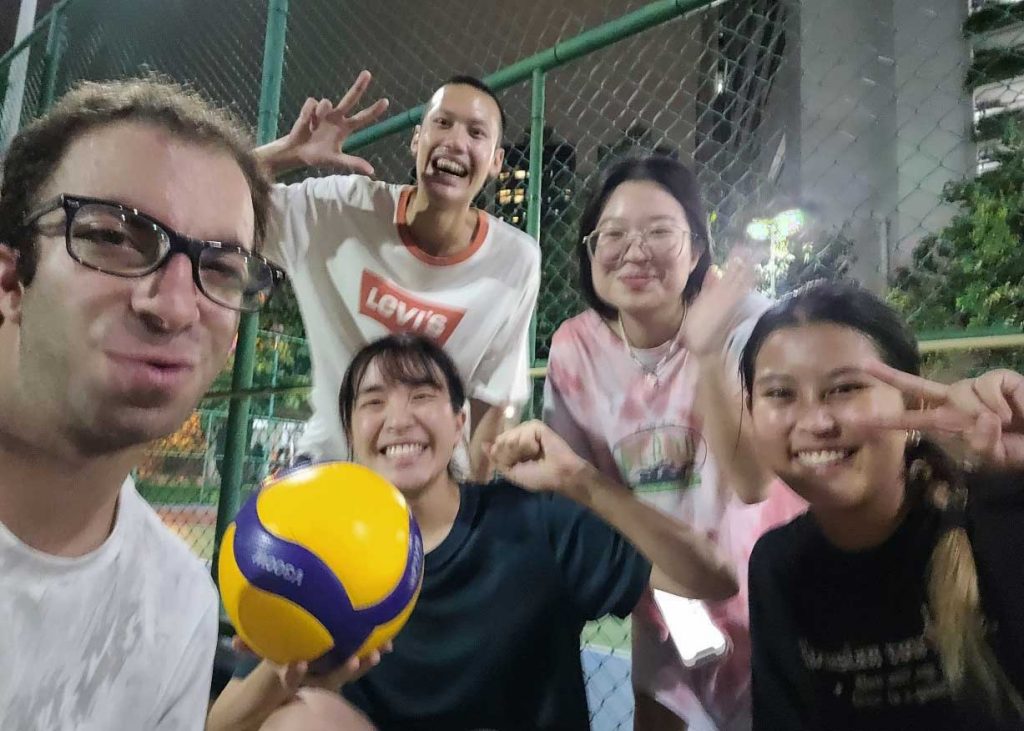Join me in a captivating personal growth journey as I delve into the heart of Thailand’s scientific innovation during my time in the TAIST-Tokyo Tech Student Exchange Program: Sustainable Energy & Resources Engineering (SERE) 2023. I had the remarkable opportunity to be stationed at the Thailand National Science and Technology Development Agency (NSTDA) from August 5 to September 19. This blog post is your gateway to experiencing the bustling laboratories within the Thailand Science Park (TSP), where I got hands-on with advanced chemistry and low carbon fuel cells research. Beyond the lab, this academic visit was a deep dive into cultural immersions, from overcoming language barriers to navigating the wonders of the beautiful country of Thailand.
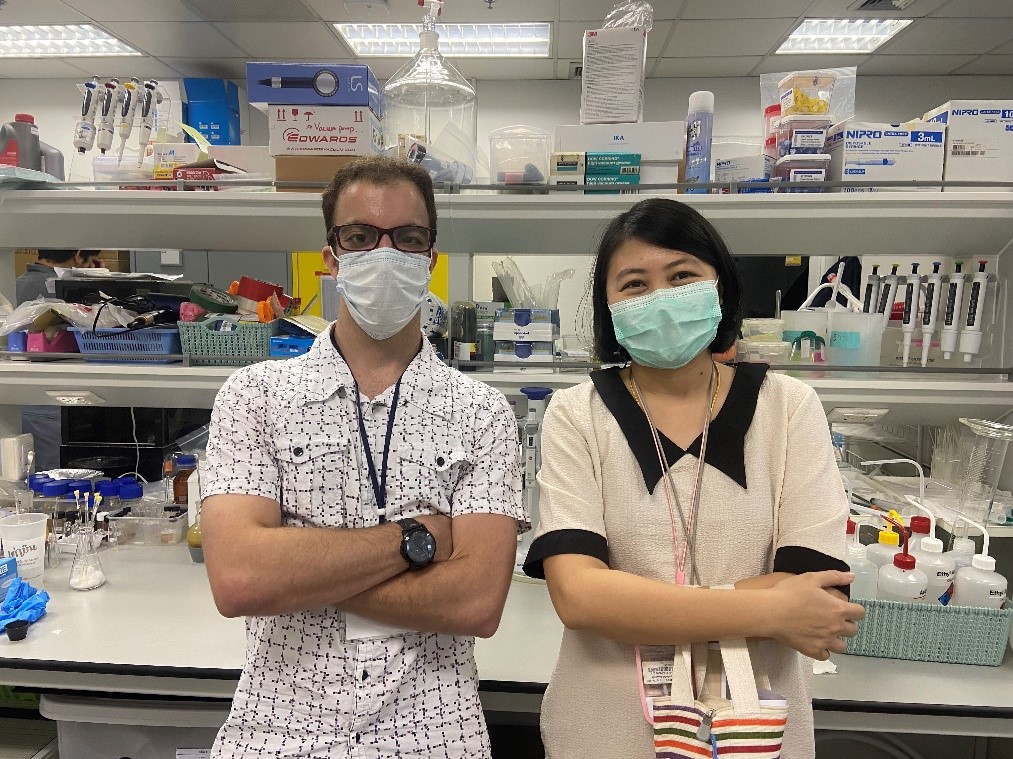
What is TAIST-Tokyo Tech Student Exchange Program in Thailand (SERE) in a nutshell?
The program serves as a 1-2 months research internship at one of the labradorites within the vast vicinity of the NSTDA’s Thailand Science Park (TSP); the first and largest integrated research facility in Thailand, located in the city of Puthum Thani, situated about 50 km away from Bangkok.
The complex of TSP is the largest, most advanced science and research dedicated governmental body that I have seen. To put it into perspective, it covers an area of 80 acres (about 320,000 square meters) and houses various state-of-the-art facilities, including laboratories, offices, and innovation spaces. The park is designed to support a wide range of activities, from research and development to business incubation and technology transfer with over 120 companies and 2,000+ full time employees, making it a central point for Thailand’s push towards a knowledge-based economy.
The main national research centers under NSTDA within Thailand Science Park include:
- National Center for Genetic Engineering and Biotechnology (BIOTEC): Focuses on biotechnology research, development, and application.
- National Metal and Materials Technology Center (MTEC): Specializes in metals, materials, and engineering.
- National Electronics and Computer Technology Center (NECTEC): Concentrates on electronics, information technology, and computer science.
- National Nanotechnology Center (NANOTEC): Dedicated to nanotechnology research and development.
- National Energy Technology Center (ENTEC): Dedicated to energy efficiency research and utilization of resources.
In addition, TSP is located near multiple other educational institutions such as Thammasat University (Rangsit campus) and the Asian Institute of Technology, which makes it in essence an excellent research hub with massive academic and industry focus collaborations in all sectors.
My laboratory was in the National Energy Technology Center (ENTEC) at Dr. Beer’s lab of advanced chemistry and low carbon fuel cells. TSP also offers accommodation for the full duration of the program; a basic shared dormitory room with a view.
Link to TAIST-Tokyo Tech Student Exchange Program in Thailand: https://www.titech.ac.jp/english/public-relations/global/featured/taist
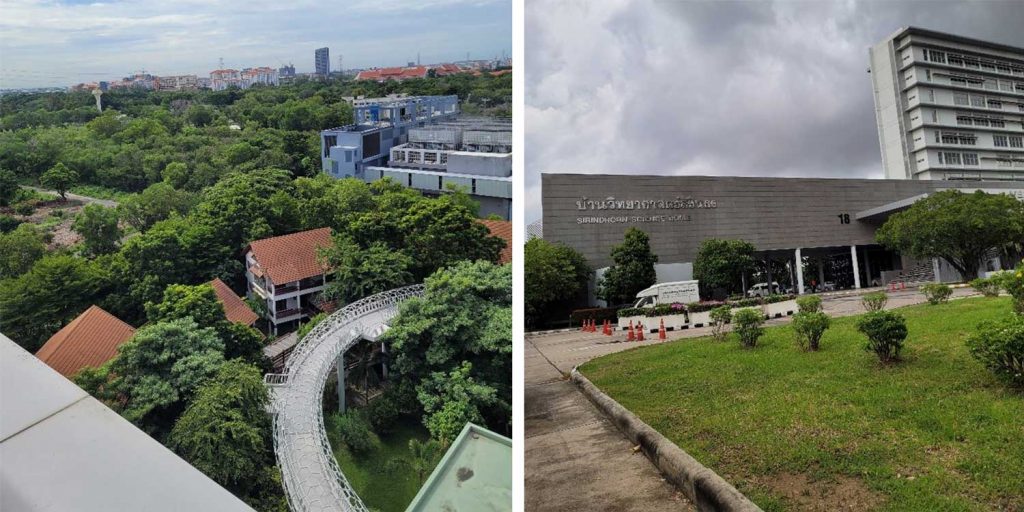
How to find exchange programs at Tokyo Tech?
Tokyo Tech, as a renowned research institution, has many international collaborations around the world from which students can benefit greatly through cultural and research exchange. I have come to know about the TAIST-Tokyo Tech Student Exchange program from the newsletter sent periodically through Tokyo Tech’s mailing system.
After carefully understanding the program’s criteria and aims, I began to prepare my application. After the successful submission of documents and approval from my academic supervisor, I was invited for an interview to showcase my capabilities and motivation to participate in the exchange. Usually exchange programs at Tokyo Tech have limited slots and many students apply. So, it is a sort of a competition between applicants of various academic and extracurricular backgrounds as well as differing motivation and potential. Upon successful selection to the program, students are asked to select some labs from a NSDTA list of laboratories that fit their profile. Tokyo Tech staff also normally help contact supervisors and assign you a suitable lab depending on possible travel dates, as was the case for me.
Following that, there are several things needed; buy flight tickets, acquire a visa to the assigned country, obtain travel insurance, and other procedures that may differ depending on the program. Tokyo Tech staff usually guide students through it and, while it can be overwhelming, it is relatively a clear step-by-step process.
I highly recommend periodically checking the Study Abroad Programs and International Experiences webpage at Tokyo Tech, to stay updated with all newly added exchange opportunities.
Link: https://www.titech.ac.jp/english/students/abroad/programs
What was my academic experience like?
During my research exchange, I focused on learning more about Microbial Fuel Cells (MFCs) and conducting an economic analysis of different types of MFCs. Going to the program, I had some time limitations of what durations I could choose to travel. So, I opted for an available lab with a new research field in advanced chemistry, which in essence was very tough as my background was far from that topic, but was also rewarding because I was able to learn more about a new field that I had never engaged in.
It was very interesting to experience the Thai working culture firsthand. Unlike laboratories in Tokyo Tech, most researchers are full time employees and are not students. So, their work contained a lot of confidential projects with governmental bodies or private companies. They also often had to meet very strict deadlines and output requirements.
During the day, I would assist other lab members in their work and try to learn about different experiments such as purification, synthesis, and distillation experiments where Palmitic acid was used to obtain a reduced acidic number. The other portion of the day I would focus on my own learning and research.
During the day, the park had a lot to see and experience from different machineries, laboratories, and coworking spacing to different restaurants, cuisines and day food markets. However, at night, the place is rather remote and one would need at least a 20-30 minute vehicle ride to the nearest train station or city center with malls or activities to see. Most workers commute daily to TSP but not many live there. So, at night it was an uneventful experience but also it was time well spent away from any distractions.
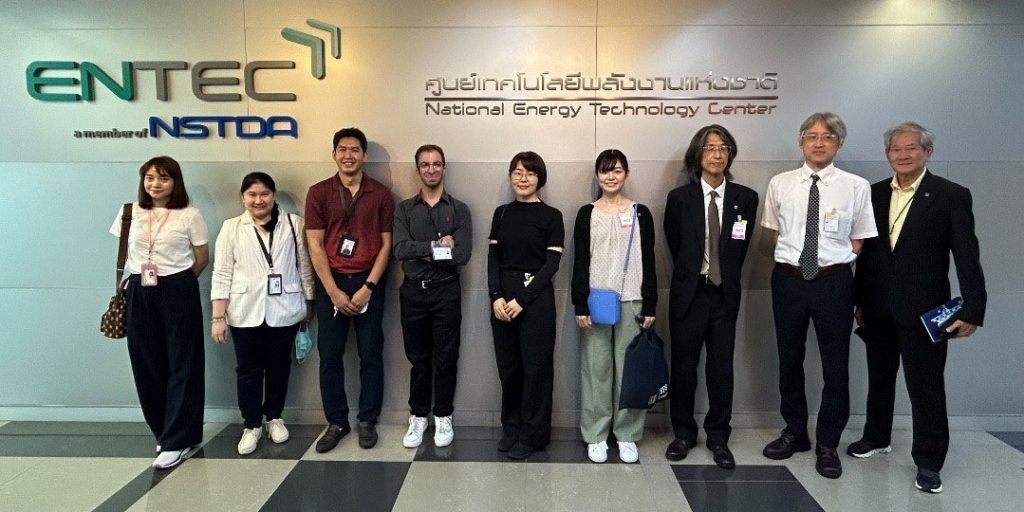
Now let’s talk about the interesting stuff…unexpected cultural shocks!
- Public transportations!
The interesting part was that navigating the bustling streets of Bangkok can feel like stepping into a live-action arcade game, especially when it comes to the city’s notorious motorbike and public transportation dynamics. Motorbikes zip and dart through the narrowest of spaces with a daredevil’s finesse, treating the city’s traffic rules more like gentle suggestions.
Mastering the public transportation maze in the suburbs has been quite the adventure! It’s been a journey of trial and error to understand the network of buses. While Google Maps tries its best to guide the way, I quickly learned that its routes and times can be more of a rough estimate than a reliable itinerary. Taxis, however, can be easily ordered via many mobile applications such as Grab or Bolt and my experience was very positive with them. Food and other amenities can also conveniently be ordered through these apps, which I found super helpful.
Meanwhile, the colorful array of buses, tuk-tuks, and taxis adds to the vibrant chaos, each maneuvering with an unspoken language of honks, waves, and daring turns. For a student exchange participant, this pulsating rhythm of Bangkok’s streets isn’t just a daily commute; it’s an adrenaline-fueled adventure, offering an authentic taste of the city’s lively, unpredictable spirit.
- Stray dogs…cute or scary?!
In Bangkok, you’ll quickly notice that it is full of stray dogs, known locally as ‘soi dogs’. These street dogs are part of the city’s charm, often found napping in markets or wandering the alleys. While they’re a familiar sight for locals, they can surprise or be a little scary for newcomers. Residents often feed and care for them, showing the city’s warm heart. The highlight of my trip was seeing cute dogs chilling and even swimming in the beach!
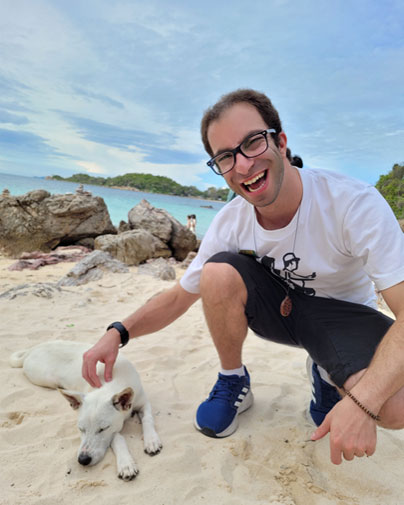
- My favorite activity, food fairs literally everywhere!
One of my absolute favorite activities in Bangkok has to be the never-ending food fairs! It’s like the city is just one big food festival. Every visit to these vibrant fairs is a new adventure for my taste buds, offering everything from sizzling street snacks to exquisite local delicacies. The lively atmosphere, the aroma of spices, and the joy of discovering a new favorite dish make these food fairs a must-experience. Even at TSP there was a large food fair every Tuesday and sometimes even multiple times a week. For a student on an exchange, it’s not just about the food; it’s about soaking in the local culture one delicious bite at a time!
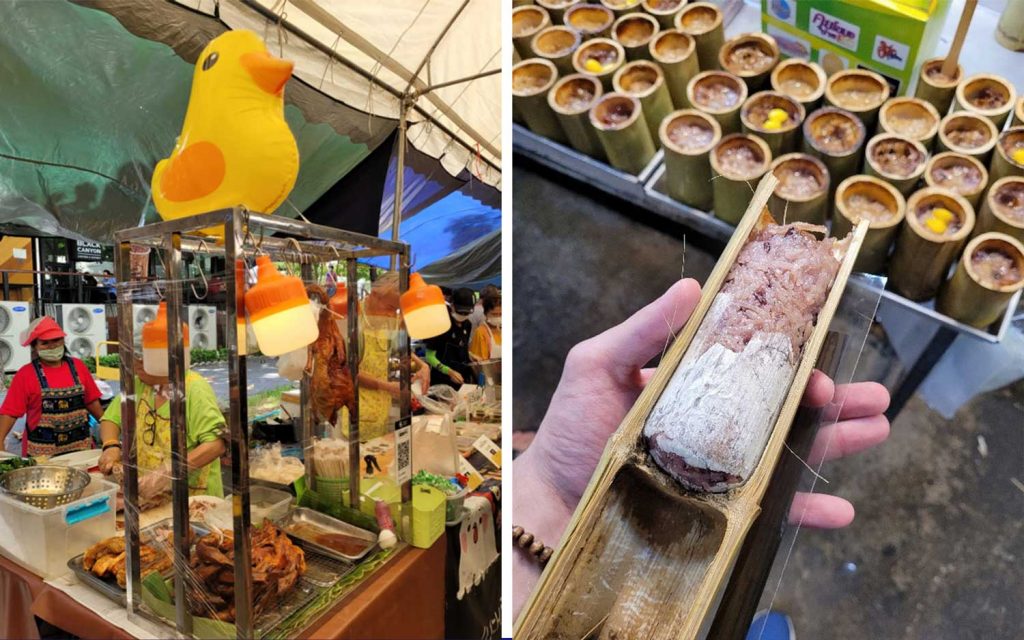
Cultural Experience:
Thai culture to me is interesting and resembles Japanese culture in many aspects, such as respectful language to address others who are older, and being shy at times. It was also blended with a more chaotic twist that can be a double edge sword as it can be fun at times with people seemingly being more relaxed to be louder, interactive and expressive, but it can also lead to less appealing aspects in lack of punctuality and order sometimes.
- Challenges and growth:
Being in TSP was certainly an exceptional research opportunity and I’m grateful to have been able to experience such a place. However, one can’t help feel a little isolated as most of my lab mates barely spoke any English. They were all nice and welcoming, but they felt shy to try to communicate with me in many instances due to the language barrier, and I faced a challenging time at the beginning when being taught new experiments or technical topics. Thankfully, I was able to be more expressive and used many tools such as gestures, drawings, texting, and translation apps to communicate and they have been very nice to me. Of course, this was just my case as other exchange students had more lab mates who were able to speak English fluently with no issues.
The other challenging aspect was the accessibility of TSP after the working day ends. Though it’s perfect for research activities during the day, the park turns into a ghost town in the evening, with everything being so far away. It also takes a lot of time to commute and is really tough to get to using public transportation. Especially on weekends, there was absolutely nothing happening there and usually no employees were present except the guards. So, one can’t help but feel a little isolated. I slowly got used to this, however, as I managed to navigate through local transportation methods. While it was tiring and sometimes stressful, I learned to appreciate that feeling of being away from distractions and utilize it to be more productive.
These challenges are minor, however, and my overall experience was very positive.
- My favorite experience in Bangkok
Thailand and specifically Bangkok is an amazing place! I had so much to explore in the city. Bangkok’s charm lies in its vibrant blend of tradition and modernity, there is something for everyone in terms of taste, activities and belonging. One of my favorite experiences was dressing in traditional Thai attire while exploring one of the most notable temples; Wat Arun, known as the Temple of Dawn, a stunning emblem of Bangkok’s spiritual heritage surrounded by beautiful scenery.
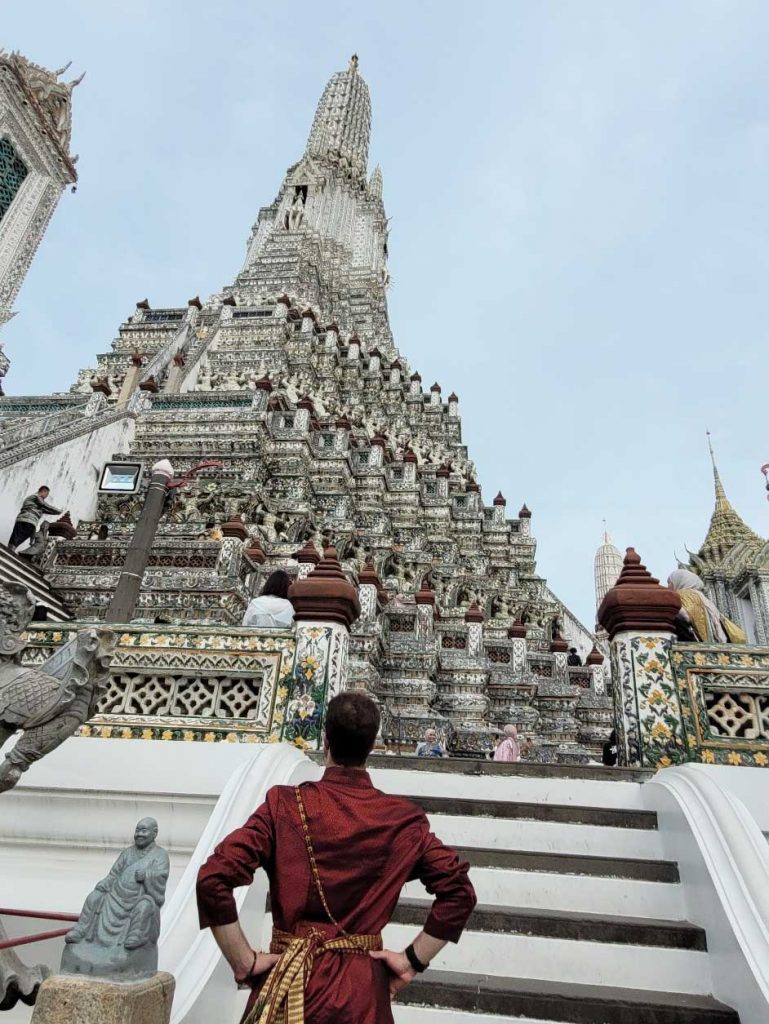
- Ending on a high note!
Wrapping up an unforgettable journey! Thailand has enriched my life with fresh perspectives. I’ve marveled at stunning sites, savored unique food, broadened my academic horizons, and shared moments with friendly locals.
The warmth of the city’s residents made every interaction feel deeply familiar, weaving a tapestry of cherished memories and friendships. Thailand with its captivating blend of chaos and elegance, vast spaces, and the genuine kindness of the people have left me in awe and looking forward to visiting again someday. The slightly blurred picture below encapsulates Bangkok’s warmth perfectly. It was in a public park, where the bonding over sports and learning about each other’s cultures turned strangers into friends in mere moments.
